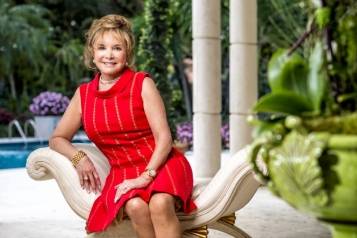
Today, a staggering 350 million individuals worldwide suffer from depression, yet it is a topic seldom discussed. Maybe it is because there is still a social stigma surrounding mental illness; maybe it is because the disease lacks adequate government funding; or maybe it is because there has been virtually no change in basic treatment since the introduction of Prozac more than 25 years ago. Well, philanthropist and former business executive Audrey Gruss is not interested in finding out why—she is razor-sharp focused on figuring out how. How can we eradicate this debilitating disease, which is the number one cause of disability in people aged 14-44, and is on track to become the number one culprit in individuals of all ages by 2030?
In 2006, Gruss created the Hope for Depression Research Foundation [HDRF] in honor of her late mother, Hope, who battled the disease for most of her adult life. “I always thought that she was getting the latest and newest medications, but after she died, I started digging deeper. I just never understood why she did not get totally well,” Gruss explains. “If she was getting all of these different medications, and they were switching them up and trying new things, then why wasn’t she 100 percent as I remember her from childhood? She was funny, she always sang, she loved culture, and she wrote every single day of her life.”

As Gruss continued to do research and meet with different psychiatrists and neuroscientists, she learned that there is no real diagnosis for depression—no personalized approach and no means of prevention for the disease. What’s worse, most medications are simply administered on a trial-and-error basis. “They really do not know what causes depression,” she admits. “Everyone thinks you can either go into therapy or take a pill and you will feel better, but the difficult part is that only about half of the people who should be seeing a doctor even go to one, and only 50 percent of those who take medication even respond to it. So we are really talking about a crisis.”
To help solve the epidemic, Gruss’ foundation approaches the problem twofold: through fundraising and by implementing a research arm. “The research that is being done by our Depression Task Force is considered the most advanced in the country,” she states emphatically. “Most research is done by doctors and neuroscientists in their individual labs at their individual universities. It’s very competitive—doctors try to get the most money for their own labs and they only share that research when they publish it or at annual conferences. The process takes such a long time for that information to be incorporated into research by other doctors.”

In an attempt to streamline the development and share immediate results, the HDRF assembled seven leading neuroscientists, including two Nobel Prize laureates, to work together, collaborate, and create one overarching research plan. “They are each doing a piece of it and they are sharing information in real-time at a new data center we set up called the HDRF Data Center at the University of Michigan,” she continues. “Our goal is to develop a medical diagnosis for depression where a person can take a blood test and get a brain imaging scan, and whatever else we can develop, so that doctors can diagnosis exactly what a person has and what kind of medication he or she needs. The next goal is to devise new treatments, and the third goal is to develop prevention.”
As the Depression Task Force whittles away in the laboratory, Gruss and the rest of her team continue to raise public awareness about the disease, even attracting the help of a few famous faces. Over the last eight years, numerous celebrities like Brooke Shields, Richard Dreyfuss, Candace Bushnell, Linda Hamilton, and Terry Bradshaw have spoken at HDRF events about their own challenges and experiences relating to depression. “For every celebrity that opens up, there are millions of people who suffer in silence and who do not get the help that they need,” she reveals. “We do not have the government declaring a war on depression.”
Though Gruss has definitely made progress in fostering awareness about depression—her annual winter HDRF luncheon and seminar attracts socialites and star power alike—at times, she says she feels like a little cry in the wilderness. But for Gruss, it is about more than simply putting her luncheon on the map. “We have people who never have mentioned the word ‘depression,’ even in casual conversation, who are now saying, ‘Oh, I’m going to the depression lunch. Are you coming?’”

PAYING IT FORWARD
What was the most difficult part about watching your mother struggle with depression?
The helplessness. There was nothing I would not do for her. She got the best doctors and the latest medicine, but there was still the frustration of not having her be totally cured.
Why do you think that there have not been advances in the basic treatment of depression?
The gold standard of treatment is still electroshock therapy—and that has not changed in 100 years. It has evolved, but it is still the gold standard, which is just so crazy. We have had such advances in so many areas—look at our lives, look at technology—yet there has been so little money spent on mood disorders because there has been a stigma attached to mental illness.
Why do you feel that is?
It’s frightening; it’s something you can’t see. You can always see a broken leg, but you cannot see the imbalances in the brain that cause depression. So we have been able to identify a circuit in the brain that involves depression, and we are looking for genes and biomarkers that might indicate what new treatments can be developed.
Is there a way that people can get involved with HDRF, besides donating money obviously?
Absolutely. We can use volunteers in many ways at our office. We always need help with our special events, as well as e-blasting information and making calls to follow up on things. We can use help from anybody.




















